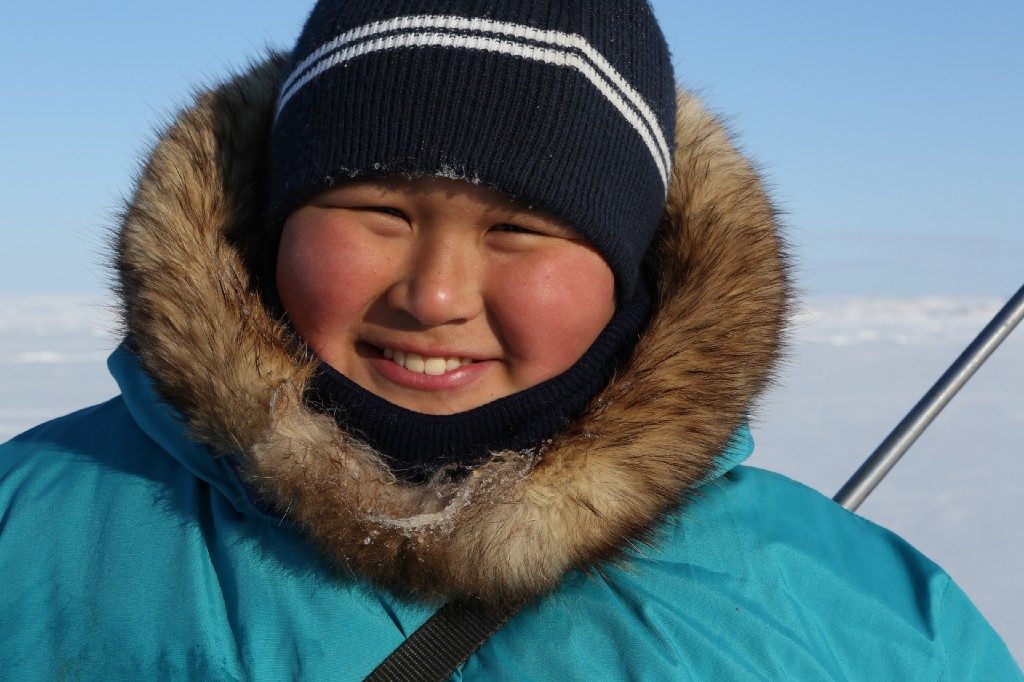Alethea Arnaquq-Baril is an Inuit filmmaker from the Canadian Arctic, where her production company, Unikkaat Studios, is based. For her award-winning APTN documentary “Tunniit: Retracing the Lines of Inuit Tattoos,” Arnaquq-Baril traveled across the Arctic to speak with elders about Inuit tattoo practices and the causes of their near-disappearance — before getting her own traditional face tattoos. She also directed the short “Inuit High Kick,” the award-winning National Film Board animation “Lumaajuuq: The Blind Boy and the Loon,” and the animated short “Sloth.” Most recently, Arnaquq-Baril directed “Aviliaq: Entwined.” (Press materials)
“Angry Inuk” will premiere at the 2016 Hot Docs Film Festival on May 2.
W&H: Describe the film for us in your own words.
AAB: I’m trying to save my world, one sealskin at a time.
W&H: What drew you to this story?
AAB: A burning need to publicly reject the shame people try to put on my people for hunting, eating, and wearing seal. We have a beautiful traditional culture, but we’re also modern people who have to pay rent, and buy toothpaste and iPhones, just like everyone else.
I got a little tired of people thinking we still live in igloos and don’t need money. We eat a lot of seal meat. We want to sell the fur from those seals because we’re hunting them for food anyway, and we need the money. People need to know this.
W&H: What do you want people to think about when they are leaving the theater?
AAB: “I can buy gorgeous, luxurious sealskin shoes, support the people protecting the Arctic environment, and help feed hungry children in one fell swoop. Holy shit. Win-win-win.”
W&H: What was the biggest challenge in making the film?
AAB: Getting animal-rights activists to talk to me. For some reason, they seem terrified of a tiny little Inuk woman. I’m really nice, I swear.
W&H: How did you get your film funded? Share some insights into how you got the film made.
AAB: A combination of grants, equity funding, and a broadcast license. It took several years to get it together, and I did it by attending Hot Docs rendezvous meetings, then pitching at the IDFA Forum, then at the Sheffield Doc/Fest’s MeetMarket. I just kept showing up places, learning from the people who rejected me, and each time my concept for the film became stronger.
Jan Rofekamp from Films Transit International helped connect me with EyeSteelFilm, based out of Montreal, to be my producers and mentor me, and they took me under their wing. They make amazing documentaries, and as soon as they were attached, there was much more interest in my film.
Eventually, the National Film Board of Canada took interest, and it ended up being a co-production between my company and the NFB, in association with EyeSteelFilm. I think that, normally, given that I had so little experience, the film would have been a co-production between EyeSteelFilm and the NFB, but [EyeSteelFilm producers] Dan Cross and Bob Moore really supported me wanting to be a producer as well as the director, and saw the value in letting me produce it through my company with them on board as mentors. It was crazy nice of them.
In order of size of contribution, the funders ended up being: National Film Board of Canada, Canada Media Fund (POV documentary program), Nunavut Film Development Corporation, broadcast license from Super Channel, federal tax credits from the Government of Canada, and a development loan from the Shaw Media Hot Docs development fund.
W&H: What’s the best and worst advice you’ve received?
AAB: Both come from when I asked the same question to different women in the industry:“Is my career going to get all messed up when I have a child? How do you plan for having a baby when you never know when you’ll get all the funding in place and the green light for your next film?”
The best and most reassuring advice was [from filmmaker] Danis Goulet, who said, “It’s really fucking hard. Some funders understand the delays that come with an unexpected child, and some will be assholes about it. Don’t expect women to be automatically supportive — sometimes they are the worst about it. It’s really hard, but your priorities change and it’s all for the better. I’m a better filmmaker now that I’m a mother.”
The worst and least helpful advice was from literally dozens of other women filmmakers I spoke to. They said, “Oh, you just figure it out, it’ll be fine.”
W&H: What advice do you have for other female directors?
AAB: I think it’s a bit early in my career for me to be giving advice on filmmaking. But I’m wearing a great shirt right now, made by a native-owned company called She Native, that I’ll quote: “She believed she could so she did.” This shirt got me through post-production on those days when I didn’t think I could make it.
W&H: Name your favorite woman-directed film and why.
AAB: I have a really hard time with the idea of “favorite” anything. Different films touch me for different reasons.
But right now I’m feeling very vulnerable about putting this film-baby out into the world and dealing with the fallout from animal-rights groups, so I’ll name a film that made me feel like I can handle it: “My Legacy,” by Helen Haig-Brown.
She handles vulnerability and pain with tenderness and a light touch that can only come from having a spine of steel. She rips the bandages off the most horrific, festering wounds, but by the end of it, somehow you feel whole and happy and satisfied, and like you’re a better person for it. Her work surprises me every time. I also love how many strong, sweet, tender men there are in her films. I want to be as good at life — and filmmaking — as Helen is.







